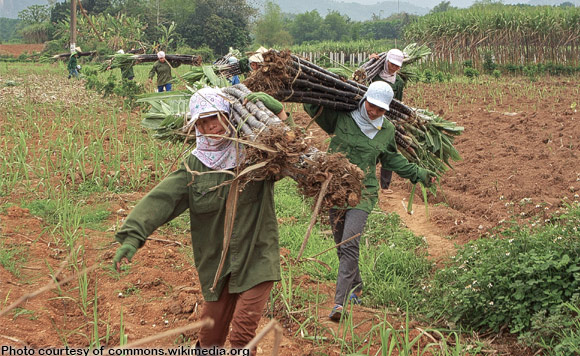The Coalition of Agricultural Workers International (CAWI) joins the rest of the working people around the world in observing the International Workers’ Day today. We raise our voices with them in demanding that the collective rights of workers in all sectors be recognized, respected and advanced.
Over a billion strong, agricultural workers comprise about a third of the global labor force. Through our labor, we produce many of the essential needs of the global economy, including food. As high as half a billion among us are waged workers who create the wealth of the plantation sector.1 Many others are casual and temporary workers at the beck and call of large growers. The rest are unpaid family workers forced to help grossly underpaid household members employed in plantations and big farms.
Yet, we are among the most neglected, oppressed and exploited. Plantations and other agricultural firms take advantage of the informality of our employment and the lack of social and economic protection from governments. It is estimated, for instance, that about 94% of all laborers in the global agricultural supply chain do not have clear employment contracts and do not enjoy well-defined rights or protection.2
Our right to a living wage and adequate living standards, and other basic rights that all workers are supposed to be entitled to are violated with impunity because in the eyes of labor laws, we are “invisible”. But this does not make our exploitation and oppression any less real than those being experienced by our counterparts in other economic sectors.
We suffer the lowest wages with nearly eight out of every 10 working poor in the rural areas of developing countries earning below US$1.25 a day.3 Agricultural workers are also further exploited, and our pay eroded more, by the widespread practice of piece rate system. To make ends meet, many are forced to meet unreasonably high quotas set under this system by working longer hours and by utilizing family labor (often women and children) that ends up as unpaid work.
We do not enjoy the right to job security. Casual work arrangements such as part-time, short-term or temporary contracts, on-call schedules, multi-layered subcontracts and self-employment schemes are prevalent. All these take away opportunities for us to form unions and exercise collective bargaining power to protect our rights and welfare.
Eight out of every 10 agricultural workers worldwide do not have access to basic social protections such as social security, health care and workers’ compensation.4 This is especially deplorable considering that it is a well-known fact that agricultural work presents the most hazard to laborers. An average of 170,000 agricultural workers are killed at work every year. We are twice as likely to suffer a fatal work-related accident than with workers in other sectors. The actual figures are much higher as many incidents (some say around 26,000 a year) go unreported due to the informality of agricultural work.5
One of the major sources of health risks that we – and our families – face comes from the widespread use of highly hazardous pesticides, some of which have already been banned in rich countries but continue to be used in poor countries. In a survey of seven countries in Asia between 2015 and 2017, PAN Asia Pacific (PANAP) reported that over 94% were exposed due to work-related activities with actual application/spraying of pesticides accounting for almost 48%, while more than half (52%) did not use personal protective equipment (PPE).
These are just some in a myriad of labor rights violations that agricultural workers around the world face every day.
But we also recognize that our rights as agricultural workers will only be realized through collective assertion and relentless organizing among our ranks. Our rights may not be codified in labor laws in many countries but that does not make our struggle less legitimate. In individual plantations and farms, we have already won several campaigns for job security, wage increases, etc. by building a strong movement of agricultural workers.
Indeed, our best hope to advance our rights and welfare and aspirations as agricultural workers lies in our own hands.
Long live the agricultural workers! Long live all the working people of the world!
Reference: P.P. Sivapragasam, CAWI secretary general (secretariat@agriworkers.org)
Reference: Interim report of the Special Rapporteur on the right to food, Hilal Elver, as transmitted by the Secretary-General to the United Nations General Assembly on 16 July 2018
1 International Labour Office, “Decent work on plantations”, undated.
2 International Trade Union Federation, “Scandal: inside the global supply chains of 50 top companies”, 2016.
3 Sisay Yeshanew, Assessment of International Labour Standards that Apply to Rural Employment, FAO Legal Papers, No. 100 (Rome, FAO, 2016), p. 1.
4 Food and Agriculture Organization, “Understanding decent rural employment”, 2015.
5 See https://engagethechain.org/working-conditions.








Discussion about this post